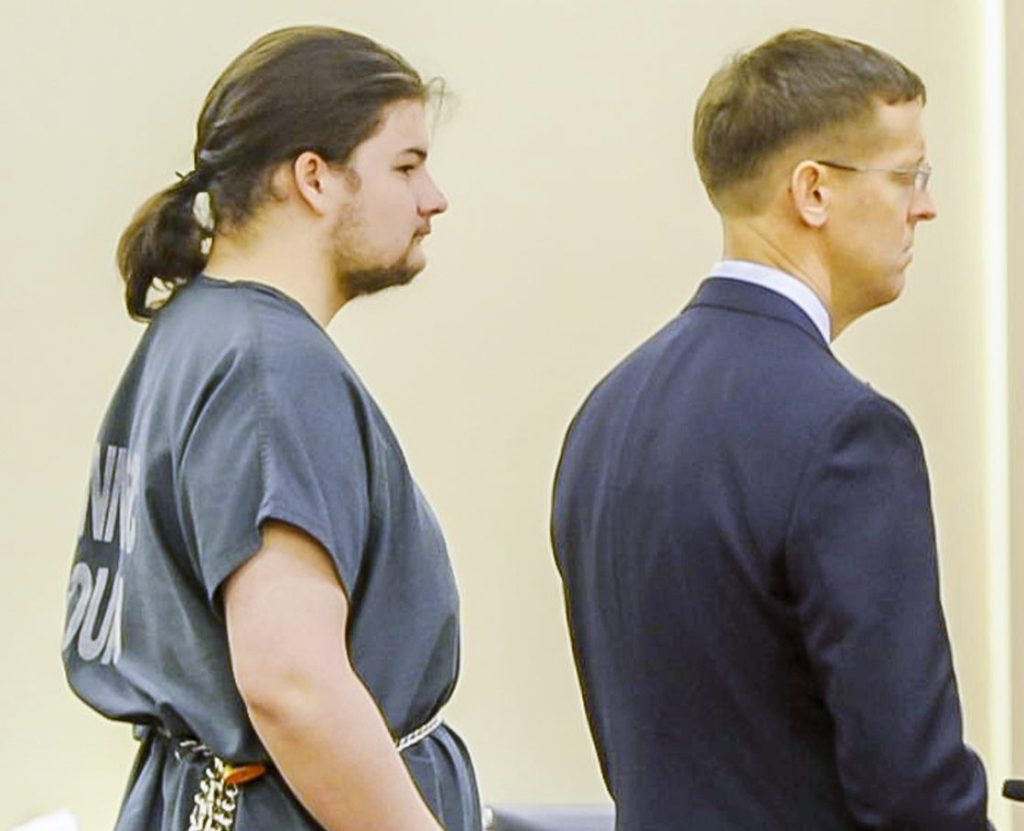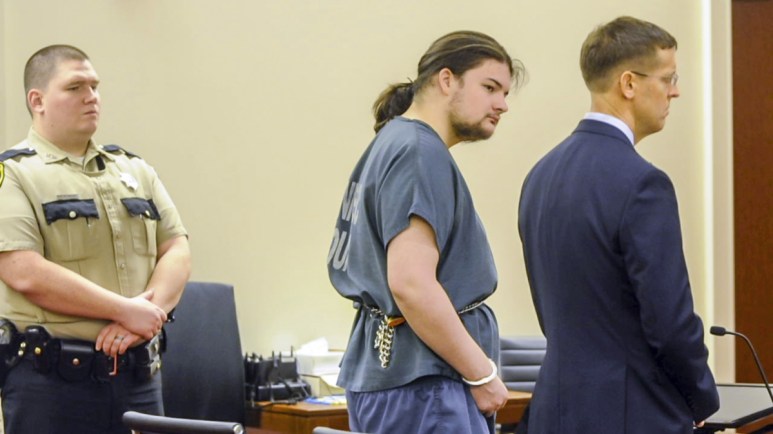AUGUSTA — The Winthrop teenager indicted on charges of murdering his parents and aggravated cruelty to animals for killing the family’s Chihuahua pleaded not guilty Friday to all three charges.
It was the first time that Andrew T. Balcer, 19, has entered a plea in the case, which stems from killings early on Halloween morning, Oct. 31, 2016. A 911 call brought police to the Balcer home, where Antonio and Alice Balcer, both 47, were found stabbed to death.
Balcer allegedly confessed to the killings and his defense has since suggested that he believed his parents were not supportive of his struggle with gender identity.
On Friday, he was in a two-piece green jail uniform with his shoulder-length dark hair tied back in a ponytail. At previous hearings, he wore street clothes. He was shackled and watched closely by four uniformed deputies.
Balcer stood and responded to Justice Daniel Billings’ inquiry about his pleas by saying, “Not guilty on all, sir.”
Balcer agreed to be held in jail day-to-day in lieu of a Harnish hearing, a special bail hearing that can extinguish the right to bail for a defendant in a murder case.
“Obviously, if the defendant wishes a Harnish hearing, let the court know and we’ll get that scheduled,” Billings said from the bench.
A trial tentatively is set for November 2018, with jury selection set for Nov. 8, according to Billings’ written order.
The arraignment took about two minutes.
Previously, Balcer’s attorney, Walter McKee, had said “no answer” to the murder charges, and the judge entered a denial on Balcer’s behalf.
Charges against Balcer, who was a month younger than 18 and a senior at Winthrop High School when the slayings occurred, were initially brought in juvenile court. However, after a two-day hearing, a judge agreed with the state that Balcer should be treated as an adult in the criminal justice system.
The case was presented to a grand jury last month in Kennebec County, and Balcer was indicted.
He was arraigned Friday at the Capital Judicial Center, with Billings specially assigned to the case. The prosecutor at the hearing, Assistant Attorney General Megan Elam, said she had no other information to present.
Balcer’s grandfather, Arthur Pierce, who testified on Balcer’s behalf in October 2017 at a bindover hearing, watched the arraignment along with two other relatives. They did not want to speak to a reporter, according to the state’s victim/witness advocate.
Pierce, a retired schools superintendent, had testified that Andrew Balcer was “demonstrably bright” but not socially interactive.
Debra Baeder, chief forensic psychologist with the State Forensic Service, who evaluated Balcer several times over the past year, testified as well, saying Balcer repressed his emotions, but they festered.
She said he was suicidal — and made several attempts to commit suicide — and “harbored some homicidal inclinations towards his parents.”
Baeder testified that Balcer told her, “I was an embarrassment; I shouldn’t have been alive.”
Baeder also said Balcer recounted an argument with his father after Antonio Balcer made a derogatory comment about a transgender person.
“He thought it could get physically confrontational if his father knew” about Balcer’s own struggles, she said.
Balcer has been held since Nov. 2, 2017, at the Kennebec County jail. Before that he was held at Long Creek Youth Development Center in South Portland.
McKee said Friday that he had seen Balcer since the indictment. “He is doing as best as can be expected,” McKee said Friday.
On an audiotape played in court during hearings about whether Balcer should be treated as an adult, Balcer told a dispatcher that he “snapped” early on Oct. 31, 2016, and stabbed his mother and father in the family home at 10 Pine Knoll Road in Winthrop. Balcer also said he killed the family’s Chihuahua because it was barking.
McKee had suggested a motive for the killings by saying that Balcer did not believe his parents would support him in his gender identity struggles.
Balcer’s older brother, Christopher, has disagreed publicly with that. Christopher Balcer said he was also unaware of any gender confusion or depression that his brother was experiencing; but he said he thought that if his brother had been going through those things, their parents probably would have rallied to his side.
Judge Eric Walker, who granted the state’s petition to have Balcer treated as an adult, said in his ruling, “The only possible motive for the murders appears to be Andrew’s perception that his parents were unwilling or unable to deal with his transgender issues. We will never know if Antonio or Alice Balcer would have been accepting, because they were ambushed and murdered by Andrew.”
At Long Creek, Balcer had asked to be called “Andrea” and wanted people to use female pronouns to describe him, a Long Creek program manager testified in court Thursday.
At a court hearing in October 2017, McKee said the defense largely was not contesting what happened during the killings.
A recording of Balcer’s call to 911, made about 1:45 a.m. Oct. 31, 2016, and a second, three-hour recording of Balcer’s interview by two Maine State Police detectives later that day were played during previous proceedings at the Capital Judicial Center.
On them, Balcer tells police he plunged a hunting knife into his mother’s back as she was giving him a hug to comfort him during the early morning hours. Her screams woke his father, and Balcer stabbed him as well, following him into the dining room, where his father went, apparently to try to get his handgun.
At that hearing, Assistant Attorney General Robert “Bud” Ellis said there were nine stab wounds to Alice Balcer’s body and 13 to her husband’s.
Andrew Balcer told police he concocted the plan while in his room, went to the dining room of the home about 1:30 a.m. to get his Ka-Bar knife — which he used for gutting animals while hunting — and then went into the bedroom where his parents were sleeping. His mother awoke when Balcer came in, and she accompanied him back to his room.
In the audio played at court, Balcer also talked about walking downstairs with the knife and his father’s handgun to confront Christopher. Balcer said his brother asked him to spare him, so he let him leave.
Balcer recalled killing Lily, the family’s Chihuahua, to stop her barking that morning.
“I did not plan to stab the dog,” he said on the recording. “The dog was an unfortunate collateral damage. I had no intention of hurting any of the animals there.”
He described his mother as “condescending” to him and said his father “didn’t care. He’s a guy who lives in my house and eats all my food.”
He also talked about hearing an occasional “tone” in his head that affects his thinking.
“I figured it’s 13 kilohertz, just a high-pitched, constant tone,” he said, adding that it was present around the time of the slaying as well.
The state police detectives who interviewed Balcer on Oct. 31, 2016, were in the courtroom Friday.
Alice “Ali” and Antonio “Tony” Balcer met while they served in the U.S. Coast Guard. She had worked at the Kennebec Valley Humane Society and the Winthrop Veterinary Hospital, and he was the chaplain in several regional motorcycle groups, often officiating their weddings and services and earning the nickname “Rev.”
Betty Adams — 621-5631
Twitter: @betadams
Comments are not available on this story.
Send questions/comments to the editors.





